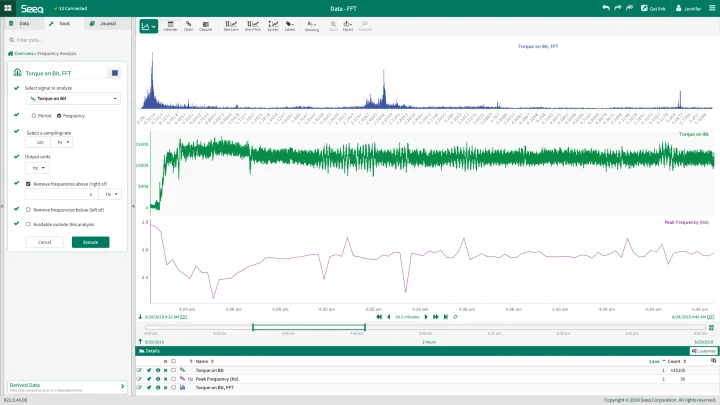Seeq to Exhibit and Present at CCP Pharma Summit

The Commercializing Continuous Processing (CCP) Summit will highlight how Seeq is helping pharmaceutical industry customers upgrade from batch to continuous processes.
SEATTLE, January 28, 2019 – Seeq Corporation will be exhibiting at the Commercializing Continuous Processing Summit to be held at the Hyatt Regency Cambridge in Boston from January 30-31, 2019.
“The rapid pace of Seeq innovation is leading to bigger customer engagements and even faster insights and impact from production data,” says Lisa Graham, VP Analytics Engineering at Seeq. “We are growing the organization quickly to keep up with customer needs in training, use case development, and core feature development.”
Lisa Graham, Ph.D., P.E. and VP, Analytics Engineering at Seeq, will be the panel lead for the opening session, and she is also co-chair of the biologics track. Seeq customer Vertex will present a poster session showing their use of Seeq with PI at the Seeq booth.
At their booth, Seeq will be demonstrating their latest release, R21, an advanced analytics solution for process manufacturing. Seeq enables engineers and scientists in process manufacturing organizations to rapidly analyze, predict, collaborate, and share insights to improve production outcomes. Customers include companies in the chemical, refining, power, oil & gas, pharmaceutical, mining, food and beverage, and other process industries.
New R21 features reflect both the growing use of Seeq for publishing analytics-based views to other employees, and the increased complexity of the use cases where engineers use Seeq. For publishing insights, Seeq has expanded “scorecards,” a feature for the display of calculated tables in Seeq Workbench and Organizer. Scorecards are used for tabulated metrics, measurements, and other summary data, and may be presented in tables with conditional formatting support and user-defined columns, for example roll-ups by batch or plant.
In addition to new scorecard and other features, R21 also adds frequency analysis capabilities, often referred to as “FFT,” to transform segments of a time-series signal into the frequency domain. Seeq users access the frequency analysis tool via an intuitive panel which guides them through the transformation process and displays results as a power spectrum, or they can access FFT functionality as a formula in Seeq’s scripting environment.
Viewing and analyzing data in a frequency domain is a common requirement in oil & gas, power generation, and other process industries as it helps engineers understand what is causing variability and the best way to deal with it. Examples of how an engineer could use FFT to understand variation of equipment and process include:
- Identify process oscillations due to poorly tuned controllers or sticking control valves
- Identify controllers oscillating with a common frequency
- Identify process variation due to poor operation or incorrect functioning of the process or equipment
- Identify process changes happening at common intervals, and identifying changes in these oscillations which may indicate problems
R21 expands Seeq’s recent focus on enabling larger deployments through scalability features and making the Seeq applications easier to use. R20 features, released earlier this year, include the ability to have live updates to Seeq Topics, which publish insights from Seeq to other users; expanded machine learning functionality for customers doing predictive analytics with Seeq; and an improved query model for customers accessing contextual data from SQL-based data sources to provide faster connections to big data sources.
R21 expands Seeq’s recent focus on enabling larger deployments through scalability features and making the Seeq applications easier to use. R20 features, released earlier this year, include the ability to have live updates to Seeq Topics, which publish insights from Seeq to other users; expanded machine learning functionality for customers doing predictive analytics with Seeq; and an improved query model for customers accessing contextual data from SQL-based data sources to provide faster connections to big data sources.
“Seeq continues to release compelling analytics solutions for customers in process manufacturing and Industry 4.0 engagements,” says Janice Abel, Principal Analyst at ARC Advisory Group. “The need for faster and better insights is a consistent requirement for customers investing in IIoT and Smart Manufacturing.”
Seeq partners with many leading process automation firms including OSIsoft, Emerson Automation Solutions, Inductive Automation, Honeywell, and Schneider Electric.
Seeq also supports all leading data historians, making it the most widely accessible and extensively used advanced analytics solution in process manufacturing companies. Supported historians include the OSIsoft PI System, GE Proficy, AspenTech InfoPlus (IP) 21, Emerson DeltaV Continuous Historian and Ovation DCS Historian, Honeywell Uniformance PHD Historian, Rockwell Automation FactoryTalk Historian, Inductive Automation’s Ignition Historian, DataParc Historian, Aveva’s Wonderware Historian, Citec SCADA, and eDNA Historian—with others in development.
To learn more about Seeq Workbench and connectivity options visit seeq.com.
About Seeq Corporation
Seeq, a global leader in advanced analytics, AI, and enterprise monitoring for industrial companies, delivers a self-service, enterprise SaaS platform and solutions to accelerate critical insights and action from historically unused data. Oil and gas, pharmaceutical, specialty chemical, utility, renewable energy, and numerous other vertical industries rely on Seeq to optimize business and production outcomes, including yield, margins, quality, and sustainability. Seeq is a privately held virtual company with employees around the globe. To learn more about Seeq, visit www.seeq.com.